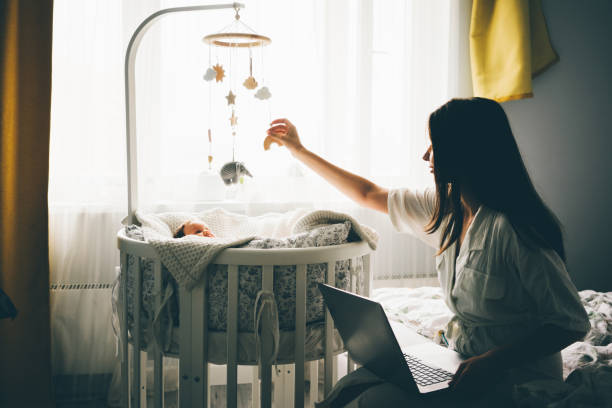
Maximising Space: How to Fit a Small Cot In Tight Spaces
Hopping on Pinterest right after you get pregnant is a common thing. Ideating your child’s nursery is every parent’s dream.
However, modern houses and apartments often become an issue when designing the ideal nursery for your child. Space crunches are common, and you must find ways to overcome them.
Therefore, to create a small nursery, you must consider every aspect, from choosing the right furniture to organising the space with all your baby’s essentials.
Also, having a well-stocked, easily accessible changing station can reduce stress during baby changing.
However, babies require surprisingly large items. Therefore, when choosing storage solutions for at-home nurseries, they should focus on clothes, diaper essentials, and furniture.
Moreover, maximising space is crucial to avoid disorganisation and overloading the room.
Thus, this article will help you figure out ways to enhance your baby’s nursery and fit a small cot in your tight space.
How To Select The Right Cot For Your Baby?
When buying your baby’s cot, you must consider the following factors—
1. Space
When choosing a cot for your nursery or bedroom, the size of the room is an important factor to consider.
For the first six months, your baby will likely sleep in the same room as you, so choosing a cot that fits in the space is important.
A bassinet or Moses basket might be a better choice if the space is small. Moreover, when choosing a cot, ensure it can be used from birth to two years.
2. Get One With Adjustable Height
Adjustable base height cots are designed to make it easier to lift babies as they grow. The highest position is suitable for the first few months, while the middle position is used once the baby can roll to prevent falls.
The higher base makes getting the baby in and out of the cot easier. Cots are space-saving and can be used as day seats when the bed becomes too small.
When the baby becomes more mobile, lower the crib base to the next level and move it back to the lowest level once they can pull themselves up or stand up unaided.
3. Get Ones With Teething Rails
To ensure your little one’s safety, looking for a cot made with non-toxic materials is important since they may use the cot rail as a teething toy.
Get a non-toxic covering for the crib rails to ensure your child can safely chew away once their teeth appear. This will ensure child safety and health. Also, it allows you to use the same crib for longer.
4. Ensure Your Baby’s Safety
When buying a crib, it’s important to prioritise baby safety. To ensure this, you can keep the gap between the mattress and the crib no larger than 3cm.
However, ensure your baby sleeps on their back, and avoid placing the crib near windows, blinds, radiators, or cords.
Lastly, you must use organic cotton crib sheets with cute patterns. Also, ensure the crib is rigid, and avoid using second-hand mattresses.
For maximum safety, always purchase new mattresses for your baby.
How To Maximise The Space In Your Baby Nursery?
Mentioned below are some of the most effective tips every parent must consider when maximising the space in their baby’s nursery—
Get Multi-Functional Furniture For Extra Storage Space
To maximise floor space, consider a smaller cot if you have limited space. A chest of drawers can be a useful starting point for a changing area, allowing you to store essentials and baby clothes in one place.
Moreover, use woven baskets to keep your space organised in small areas. This option is great; you can tuck these baskets into the room’s corners.
Plastic storage tubs can be placed under the bed as most cribs are high enough. This is a great place to store outgrown or too-big clothes, and a stylish crib skirt can cover them up.
Using these storage solutions, you can create a functional and organised space for your baby’s room.
Arrange According To The Room’s Flow
Just like a kitchen has an ideal flow to make cooking easier, you must lay out your baby’s nursery similarly. This makes caring for your baby more manageable.
Therefore, keep your chair close to the crib to limit the distance you travel with your baby at night.
You will likely be tired, so it’s best to make things easier on yourself – avoid putting the chair across the room where it’s easy to trip on toys.
Similarly, with your changing station, setting up a changing area nearby is advised, especially if you plan to store diapers in the closet.
This way, you won’t have far to reach when you run out of wipes in the middle of a messy diaper change.
Use As Much Of The Wall Space
One thing that often goes unnoticed in rooms is the wall space. While you can typically use walls for decoration, they can also become a useful storage space in the nursery.
For instance, if you have small figurines that you want to display but don’t have enough space, consider using invisible shelving to create a sleek design while maximising the room’s storage capacity.
Additionally, it’s worth considering vertical storage options rather than just horizontal ones.
Remove Clutter
Creating a clutter-free room is challenging, but installing storage systems can help keep the space organised and eliminate unnecessary items.
Parents can maximise their space by using storage methods for every room, including the nursery. Sustainable furniture is essential for an infant’s room, and Simply Nursery’s online store offers high-quality, natural furniture that grows with your child.
Using storage and sustainability, you can create an airy, clutter-free space for your growing child.
Using storage methods and sustainable furniture, you can create a more organised and functional nursery.
Final Thought
Consider using corners and hidden walls to create a sanctuary in your room and keep essentials nearby. Moreover, consider placing a small table in your corner, like a shelf or drawer, to organise essentials.
Also, over-the-door hangers and storage bags can store coats and personal care items. Therefore, hangers work well for coats and long-sleeved jackets, while storage bags hold hygiene and cleaning supplies.
When decorating the nursery, choose colours that complement each other to create an orderly room. Neutral tones like beige, grey, white, and lemon yellow can brighten and tidy the bedroom.
Lastly, enhance the organisation and functionality of the nursery by creating a sanctuary and keeping essentials organised in corners and hidden walls.
MORE FOR YOU:
Already have an account?
Sign In
Create your account
User added successfully. Log in








